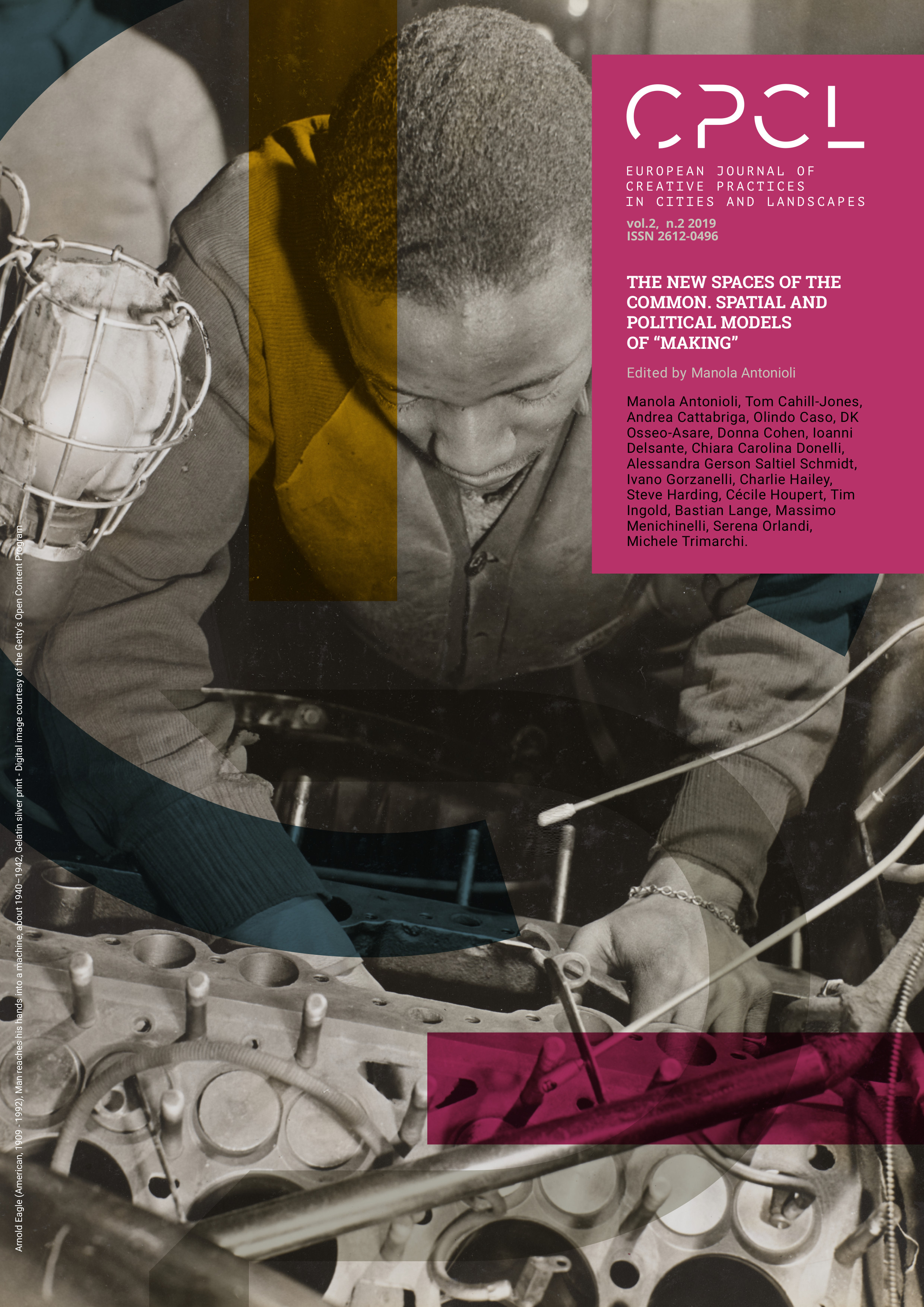Of Work and Words: Craft as a Way of Telling
DOI:
https://doi.org/10.6092/issn.2612-0496/10447Keywords:
making, hapticality, habitus, embodied knowledge, tellingAbstract
This article takes issue with the notion of embodied knowledge by focusing on habit—the habit of craftsmen, artisans, musicians and scholars. The argument has two components. The first is to show that the habits that enable practitioners to move on in the accomplishment of their tasks are neither tacit nor sedimented in the body but generated and enacted in an attentive and kinaesthetic correspondence with tools, materials and environment. This correspondence is not silent and still but noisy and turbulent, open and alive to the world. To describe it, we adopt the notion of hapticality. In the domain of hapticality, thinking is the churn of a mind that stirs and is stirred by the sounds and feelings of the milieu. This why habitual action is also thoughtful, characterised by an awareness that is not so much cognitive as concentrative. This leads to the second part of the argument, which is to show that words, too, are living things, immersed in the currents of hapticality. Thus we refute the opposition, built into the constitution of the academy, between verbalisation and embodiment. Work and words, we insist, are animate. They both unfold in habit and afford ways of telling.References
Bourdieu, Pierre. Outline of a Theory of Practice. Translated by Richard Nice. Cambridge, UK: Cambridge University Press, 1977. https://doi.org/10.1017/CBO9780511812507.
Cavell, Stanley. Must We Mean What We Say? A Book of Essays. Cambridge, UK: Cambridge University Press, 1969.
Clark, Andy. “Where Brain, Body, and World Collide.” Daedalus 127, no. 2 (1998): 257–280.
Dewei, John. “Art as Experience.” In John Dewey: The Later Works, 1925-1953, Vol. 10: 1934, edited by Jo Ann Boydston. Carbondale, IL: Southern Illinois University Press, 1987.
Gell, Alfred. “The Umeda Language-Poem.” Canberra Anthropology 2, no. 1 (April 1, 1979): 44–62. https://doi.org/10.1080/03149097909508635.
Harney, Stefano, and Fred Moten. The Undercommons: Fugitive Planning and Black Study. Wivenhoe: Minor Compositions, 2013.
Ingold, Tim. Anthropology and/as Education. Abingdon-on-Thames: Routledge, 2017. https://doi.org/10.4324/9781315227191.
———. Being Alive: Essays on Movement, Knowledge and Description. Taylor & Francis, 2011.
———. Making: Anthropology, Archaeology, Art and Architecture. Routledge, 2013.
———. The Life of Lines. Abingdon-on-Thames: Routledge, 2015. https://doi.org/10.4324/9781315727240.
———. The Perception of the Environment: Essays on Livelihood, Dwelling and Skill. London: Routledge, 2000.
Mauss, Marcel. “Techniques of the Body.” Economy and Society 2, no. 1 (February 1, 1973): 70–88. https://doi.org/10.1080/03085147300000003.
Merleau-Ponty, Maurice. Phenomenology of Perception. Translated by Colin Smith. London: Routledge & Kegan Paul, 1962.
Odland Portisch, Anna. “The Craft of Skilful Learning: Kazakh Women’s Everyday Craft Practices in Western Mongolia.” In Making Knowledge: Explorations of the Indissoluble Relation Between Mind, Body and Environment, edited by Trevor H. J. Marchand, 62–69. Oxford: Wiley Blackwell, 2010.
Polanyi, Michael. Personal Knowledge: Towards a Post-Critical Philosophy. London: Routledge and Kegan Paul, 1958.
Wittgenstein, Ludwig. Tractatus Logico-Philosophicus. London: Kegan Paul, Trench, Trubner, 1922.
Published
How to Cite
Issue
Section
License
Copyright (c) 2019 Tim Ingold
Copyrights and publishing rights of all the texts on this journal belong to the respective authors without restrictions.This journal is licensed under a Creative Commons Attribution 4.0 International License (full legal code).
See also our Open Access Policy.





